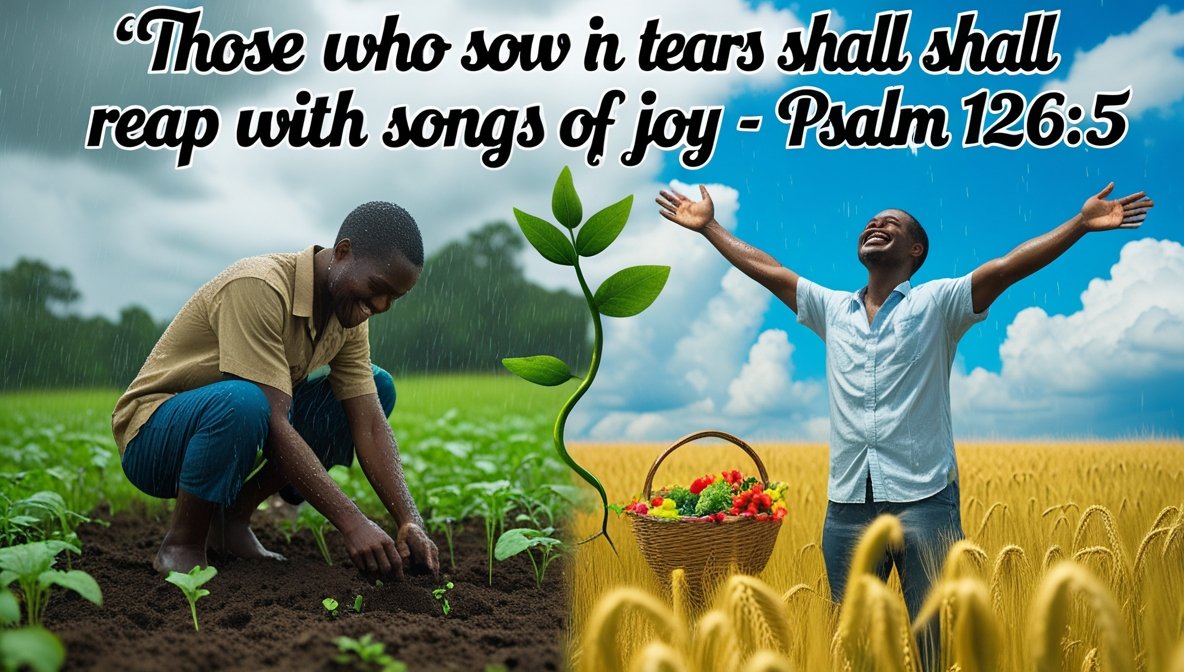Psalm 126:5–6: The Joy That Grows From Tears
In a world filled with fleeting frowns and sporadic smiles, there’s an ancient passage that offers a timeless promise of hope. You know the moments when life feels heavy, like soil that hasn’t seen rain in far too long? Psalm 126:5-6 speaks precisely to those instances, weaving a beautiful tapestry of assurance with the threads of tears and smiles. Today, we’re diving into this spiritual concept of “sowing in tears and reaping in joy,” extracting its profound wisdom and relevance for your life right now.
Unpacking the Promise: What Psalm 126:5–6 Says
In these two verses, you find a metaphor that speaks to the depths of human experience. Let’s take a look at the text itself. The verses state: Psalm 126:5-6: “Those who sow with tears will reap with songs of joy. Those who go out weeping, carrying seed to sow, will return with songs of joy, carrying sheaves with them.”
What you read here isn’t just poetry; it’s a divine guarantee that the pain you invest today will yield a harvest of happiness tomorrow. The Bible often uses agricultural imagery, and for good reason. Nature’s processes are patient, cyclic, and perennial. They mimic the movements of your life. When you’re sowing seeds of hard work, effort, and even suffering, it can feel agonizing, but Psalm 126 tells you there’s significant hope on the horizon.
The Quiet Power of Tears: Why They Matter
Tears are typically stigmatized. They’re perceived as symbols of weakness, failure, and sorrow. Yet, if you think about it, tears are also a potent emotional release. They cleanse the soul just as rain cleanses the earth. Imagine rain falling on parched land: at first, it looks muddy and chaotic, but slowly it seeps in, nourishing life beneath the surface. Similarly, your tears can set the stage for future joy.
When viewed through the lens of Psalm 126:5-6, you learn that your tears are not fruitless. They aren’t just empty droplets. Instead, they act like the rains heralding springtime, the sign that growth and joy are in pursuit. The hope lies in the understanding that our suffering is a process preparing us for greater fulfillment and happiness. It’s an emotional economy where sorrow is not wasted but invested, yielding returns of joy.
The Dynamics of Sowing: Planting Hope in Despair
One critical aspect of this process is the deliberate act of sowing. When you sow seeds, you’re performing an act of faith. You’re saying, “I believe that something small will grow into something great.” In moments of despair, it might feel counterintuitive, even futile, to keep going, to continue sowing. But Psalm 126:5-6 assures you that these efforts aren’t in vain.
Can you see the imagery of seeds being planted into the soil of your life? Rain falling on them gently, slowly but surely being absorbed. Shoots breaking ground and stretching towards the sun. That’s what sowing in tears can lead to. Your actions might be small and humble, but with the divine promise embedded in these verses, you can be certain they will yield an abundant harvest.

The Reaping: Harvesting Joy from Tears
The beauty of the harvest is one of abundance. From a few tiny seeds, blooms an entire garden. What was once dry and lifeless becomes a spectacle of colors and life. The same holds for your emotional and spiritual journey. It’s not just a return on investment; it’s an amplification, a transformation from a single moment of pain into a lifetime of joy, as promised in Psalm 126:5-6.
The act of reaping contains its own symbolism. It is a celebratory return to all the potential you’ve nurtured during periods of suffering and doubt. Pain is inevitable, but these verses assure you that joy is the ultimate harvest. Once the tears have watered your life, and you’ve nurtured the soil through perseverance, what you’ll reap is not just relief from hardship but an overwhelming sense of joy.
Personal Reflection: The Transformative Journey
Think back to a time in your life when you felt that overwhelming weight of sorrow. Maybe it was a breakup, a job loss, a time of existential dread. You sowed your tears into that chapter, however reluctantly. Now consider where you stand. Can you see how certain aspects of your life have bloomed? Maybe new opportunities, friendships, or even your own personal growth have emerged. In the complex tapestry of life, every thread of suffering weaves into a broader picture of joy and triumph.
The journey is both emotional and spiritual. You’re not just going through the motions. You’re living Psalm 126:5-6, experiencing firsthand the joy that grows from tears. The beauty of this transformation is deeply personal, uniquely yours. And no matter where you are in this cycle—sowing or reaping—the promise remains constant.
Living the Promise: Practical Ways to Cultivate Joy
Alright, so how do you live out this powerful promise in the everyday? While the concept of sorrow leading to joy is deeply spiritual, it finds its grounding in practical steps you can undertake. Remember that these aren’t just spiritual exercises but holistic practices:
- Mindful Reflection: Allocate time each day to reflect on where you are in your emotional cycle. Are you in a period of sowing or reaping?
- Gratitude Journaling: As cliche as it sounds, jotting down things you’re grateful for can create a mindset shift from focusing on sorrow to anticipating joy.
- Acts of Kindness: Both for yourself and others, small acts of kindness can cultivate a more fertile ground for joy.
- Community Support: Lean into your community, whether it’s friends, family, or spiritual groups. Shared burdens are lighter, and they help you see the joy from tears more clearly.
These acts might seem simple, but just like sowing seeds, they promise a harvest of joy that is bountiful and meaningful, echoing the message of Psalm 126:5-6.
The Rain and Bloom Cycle: A Nature’s Lesson
Picture a rose—it begins with a bud, closed and unassuming. With the right conditions—rain, sunlight, time—it blossoms into a beautiful flower. This natural cycle mirrors the journey outlined in Psalm 126. The rain of your tears is necessary for the bloom of joy. Without them, the soil of your soul remains arid, incapable of nurturing the seeds planted there.
Nature shows you that while the process might be slow and sometimes imperceptible, it is constant and inevitable. By embracing this pattern, you can more easily weather the storms of life, knowing that every tear contributes to a future flower.
Finding Your Parables: A Personal Take on Psalm 126
Think of your life as a parable. Just as Jesus used stories to unfold divine wisdom, your experiences can be rich narratives filled with lessons. Psalm 126:5-6 serves as a framework for your own stories of transformation. As you navigate your daily life, look for moments that speak to this cycle.
Maybe it’s a conversation with a friend, an accomplishment after hard work, or an unexpected opportunity. Each of these can be a personal parable, where you sowed tears and reaped joy. When you recognize these parables, you not only honor your journey but also invite others to see how divine truths unfold in every corner of existence.
Final Thoughts: Embracing Joy from Tears
So, what’s the takeaway here? Life isn’t about avoiding tears but understanding their integral role in the cycle of joy. It’s about finding solace in Psalm 126:5-6, which reassures you that no tear you shed is in vain. They are, in fact, essential chapters in the compelling story of your life.
Embrace the tears, nurture your seeds of hope, and savor the joy that inevitably follows. This spiritual growth isn’t a quick fix but a profound journey, inviting you to transform through the cycles of nature, emotion, and faith. As the psalmist promises, those who sow in tears will indeed reap with joyful songs.
Explore More
For further reading and encouragement, check out these posts:
👉 7 Bible Verses About Faith in Hard Times
👉 Job’s Faith: What We Can Learn From His Trials
👉 How To Trust God When Everything Falls Apart
👉 Why God Allows Suffering – A Biblical Perspective
👉 Faith Over Fear: How To Stand Strong In Uncertain Seasons
👉 How To Encourage Someone Struggling With Their Faith
👉 5 Prayers for Strength When You’re Feeling Weak

📘 Jesus and the Woman Caught in Adultery – Grace and Mercy Over Judgement
A powerful retelling of John 8:1-11. This book brings to life the depth of forgiveness, mercy, and God’s unwavering love.
👉 Check it now on Amazon
As a ClickBank Affiliate, I earn from qualifying purchases.
Acknowledgment: All Bible verses referenced in this article were accessed via Bible Gateway (or Bible Hub).
“Want to explore more? Check out our latest post on Why Jesus? and discover the life-changing truth of the Gospel!”








